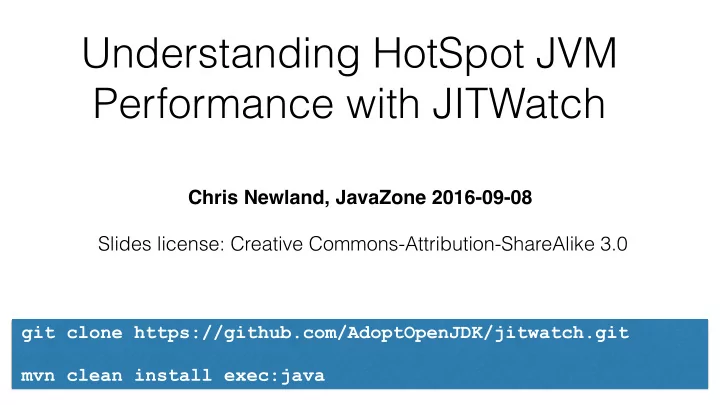

Understanding HotSpot JVM Performance with JITWatch Chris Newland, JavaZone 2016-09-08 Slides license: Creative Commons-Attribution-ShareAlike 3.0 git clone https://github.com/AdoptOpenJDK/jitwatch.git mvn clean install exec:java
Bio Chris Newland Market data guy at @chriswhocodes on Twitter git clone https://github.com/AdoptOpenJDK/jitwatch.git mvn clean install exec:java
The amazing JVM
Java, Scala, Groovy, Clojure, JS, JRuby, Kotlin, … Object-oriented and functional! Strongly and dynamically typed! Memory management and concurrency!
Abstraction! All problems in computer science can be solved by another level of indirection, except of course for the problem of too many indirections. David Wheeler
A common language High level language (Java) Source compiler (javac) Bytecode Virtual machine (JVM) Platform (OS and hardware)
Bytecode (Portable instruction set, 256 possible instructions) javac public int add(int a, int b) public int add(int, int); { descriptor: (II)I return a + b; flags: ACC_PUBLIC } Code: stack=2, locals=3, args_size=3 0: iload_1 1: iload_2 2: iadd 3: ireturn Interpreted on a virtual stack machine
A simple interpreter while (running) { opcode = getNextOpcode(); switch(opcode) { case 00: // handle break; case 01: // handle break; ... case ff: // handle break; } } http://docklandsljc.uk/2016/06/hotspot-hood-microbenchmarking-java.html
Running faster Ahead of Time (AOT) Produces native executable Knowledge of target architecture Full performance from the start Just In Time (JIT) Profiles running code Adaptive optimisations Takes time to build a profile
The HotSpot JVM Bytecode Interpreter Server (C2) Client (C1) JIT Compiler JIT Compiler Deopts Opts Code Cache (Compiled methods go here) *Very tuneable. Such -XX:+PrintFlagsFinal. Wow!
java -XX:+UnlockDiagnosticVMOptions -XX:+PrintFlagsFinal | \ egrep -i "compile|tier|cache|inline" bool AlwaysCompileLoopMethods = false {product} intx AutoBoxCacheMax = 128 {C2 product} bool C1ProfileInlinedCalls = true {C1 product} intx CICompilerCount := 3 {product} bool CICompilerCountPerCPU = true {product} uintx CodeCacheExpansionSize = 65536 {pd product} uintx CodeCacheMinimumFreeSpace = 512000 {product} ccstrlist CompileCommand = {product} ccstr CompileCommandFile = {product} ccstrlist CompileOnly = {product} intx CompileThreshold = 10000 {pd product} bool CompilerThreadHintNoPreempt = true {product} intx CompilerThreadPriority = -1 {product} intx CompilerThreadStackSize = 0 {pd product} bool DebugInlinedCalls = true {C2 diagnostic} bool DontCompileHugeMethods = true {product} bool EnableResourceManagementTLABCache = true {product} bool EnableSharedLookupCache = true {product} intx FreqInlineSize = 325 {pd product} uintx G1ConcRSLogCacheSize = 10 {product} uintx IncreaseFirstTierCompileThresholdAt = 50 {product} bool IncrementalInline = true {C2 product} bool Inline = true {product} ccstr InlineDataFile = {product} intx InlineSmallCode = 2000 {pd product} bool InlineSynchronizedMethods = true {C1 product} intx MaxInlineLevel = 9 {product} intx MaxInlineSize = 35 {product} intx MaxRecursiveInlineLevel = 1 {product} bool PrintCodeCache = false {product} bool PrintCodeCacheOnCompilation = false {product} bool PrintTieredEvents = false {product} uintx ReservedCodeCacheSize = 251658240 {pd product} intx Tier0BackedgeNotifyFreqLog = 10 {product} intx Tier0InvokeNotifyFreqLog = 7 {product} intx Tier0ProfilingStartPercentage = 200 {product} intx Tier23InlineeNotifyFreqLog = 20 {product} intx Tier2BackEdgeThreshold = 0 {product} intx Tier2BackedgeNotifyFreqLog = 14 {product} intx Tier2CompileThreshold = 0 {product} intx Tier2InvokeNotifyFreqLog = 11 {product} intx Tier3BackEdgeThreshold = 60000 {product} intx Tier3BackedgeNotifyFreqLog = 13 {product} intx Tier3CompileThreshold = 2000 {product} intx Tier3DelayOff = 2 {product} intx Tier3DelayOn = 5 {product} intx Tier3InvocationThreshold = 200 {product} intx Tier3InvokeNotifyFreqLog = 10 {product} intx Tier3LoadFeedback = 5 {product} intx Tier3MinInvocationThreshold = 100 {product} intx Tier4BackEdgeThreshold = 40000 {product} intx Tier4CompileThreshold = 15000 {product} intx Tier4InvocationThreshold = 5000 {product} intx Tier4LoadFeedback = 3 {product} intx Tier4MinInvocationThreshold = 600 {product} bool TieredCompilation = true {pd product} intx TieredCompileTaskTimeout = 50 {product} intx TieredRateUpdateMaxTime = 25 {product}
HotSpot optimisations lock coarsening strength reduction loop unrolling branch prediction range check elimination inlining CHA dead code elimination compiler intrinsics switch balancing autobox elimination copy removal lock elision instruction peepholing null check elimination constant propagation escape analysis vectorisation devirtualisation algebraic simplification register allocation subexpression elimination
Compilation levels Level Description 0 Interpreter (does profiling) 1 C1 2 C1 + counters 3 C1 + counters + profiling 4 C2 More info: http://www.slideshare.net/maddocig/tiered
Compilation patterns Sequence Explanation 0-3-4 Tiered Compilation 0-2-3-4 C2 queue busy? 0-3-1 Trivial method, profiling not needed 0-1 Getters? 0-4 No Tiered Compilation Configure compiler threads with -XX:CICompilerCount
Trivial methods in the JDK Getters! https://www.chrisnewland.com/more-bytecode-geekery-with-jarscan-404
Code cache JVM region for JIT-compiled methods Can run out of space Can become fragmented -XX:ReservedCodeCacheSize=<size>m
Code cache exhaustion -XX:ReservedCodeCacheSize=4m
Sweeper activity
Guess again? Many (C2) optimisations are speculative JVM needs a way back if decision was wrong Uncommon traps verify if assumption holds Wrong? Switch back to interpreted code
Repeated deopts can cause poor performance
Logging the JIT -XX:+UnlockDiagnosticVMOptions -XX:+LogCompilation -XX:+TraceClassLoading -XX:+PrintAssembly hsdis binary in jre/lib/amd64/server
I heard you like to grep?
JITWatch Compilations (when, how) Deoptimisations (why) Inlining successes and failures Escape analysis Branch probabilities Intrinsics used Hot throws, stale tasks, and more!
Recommend
More recommend